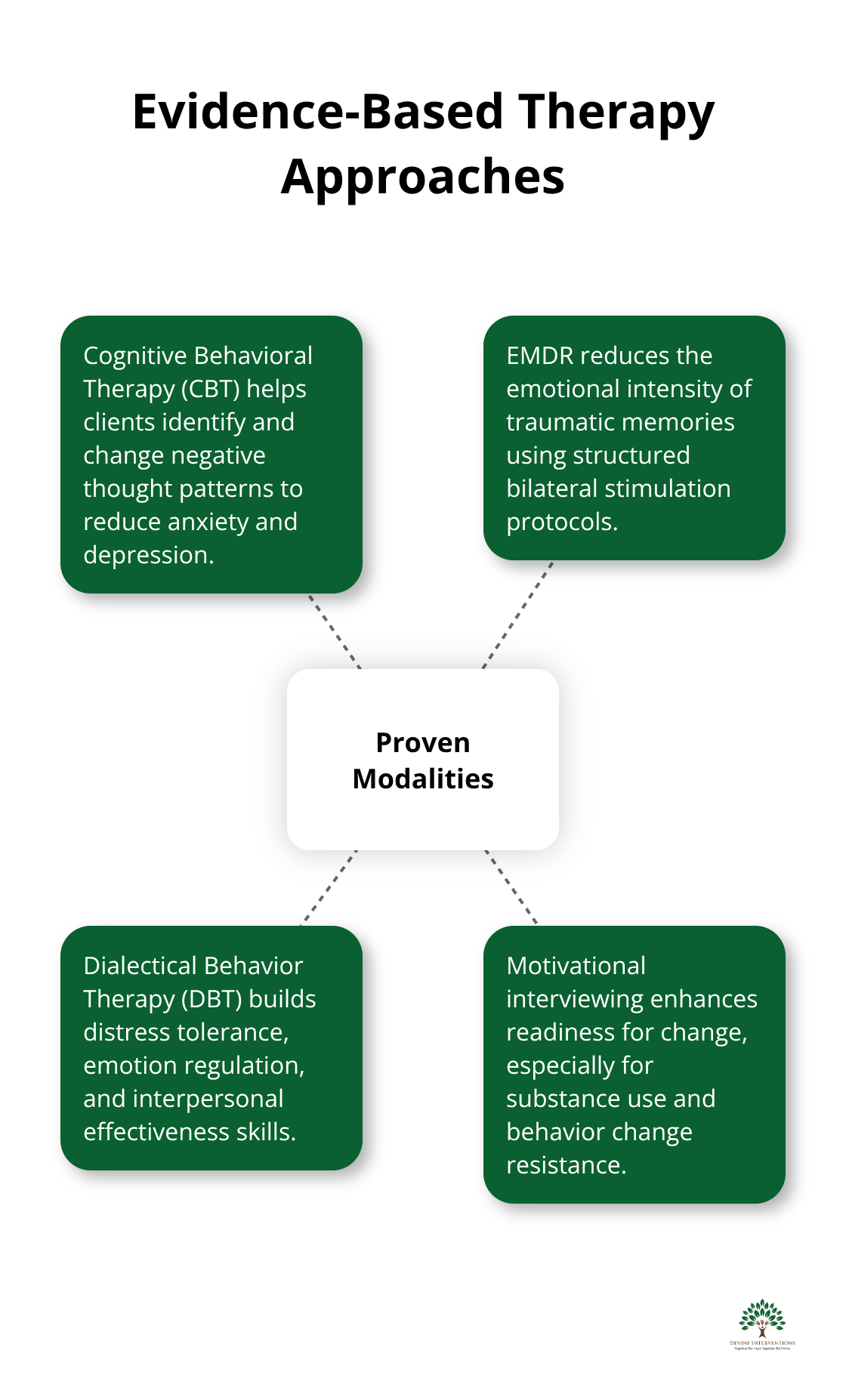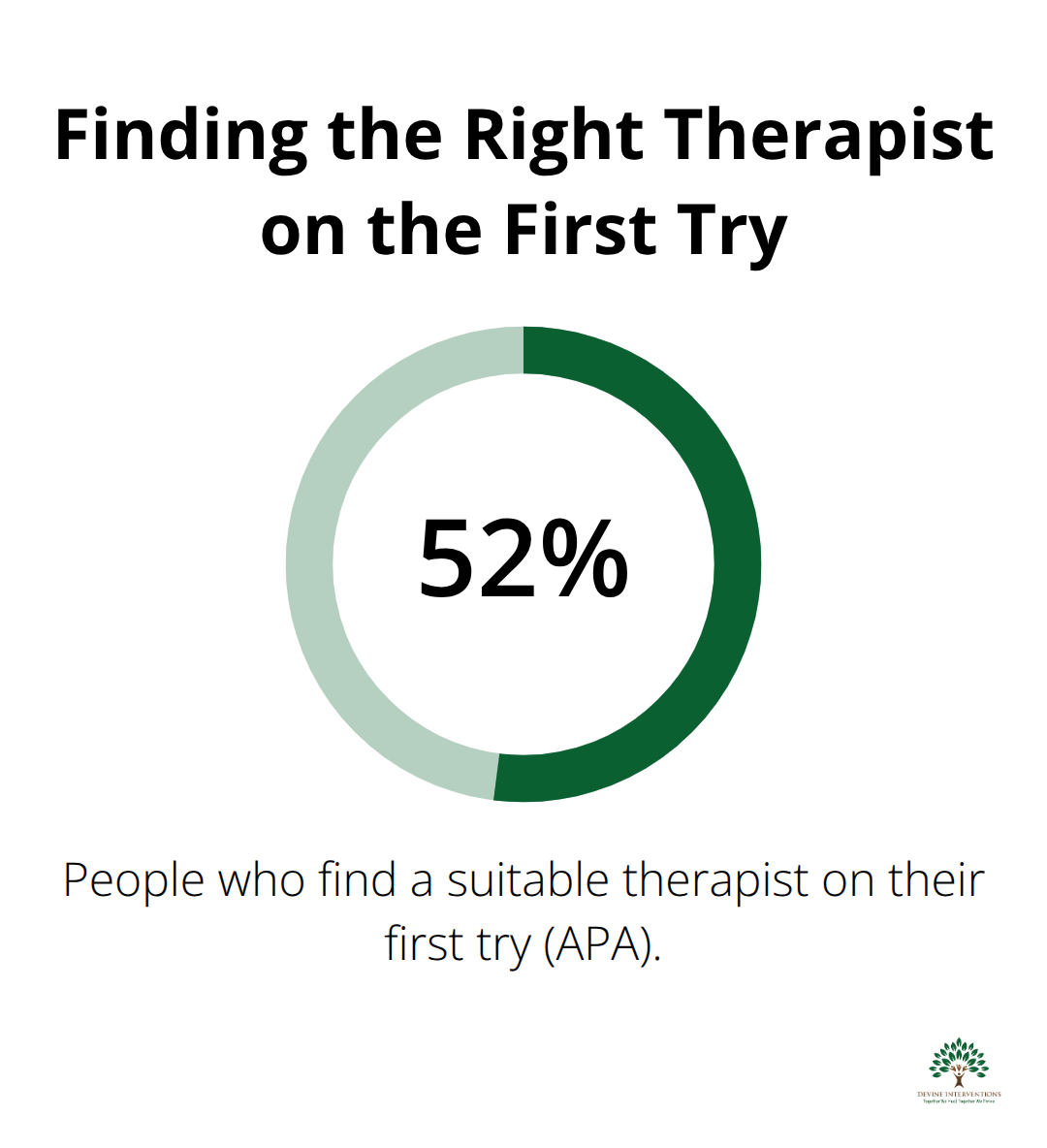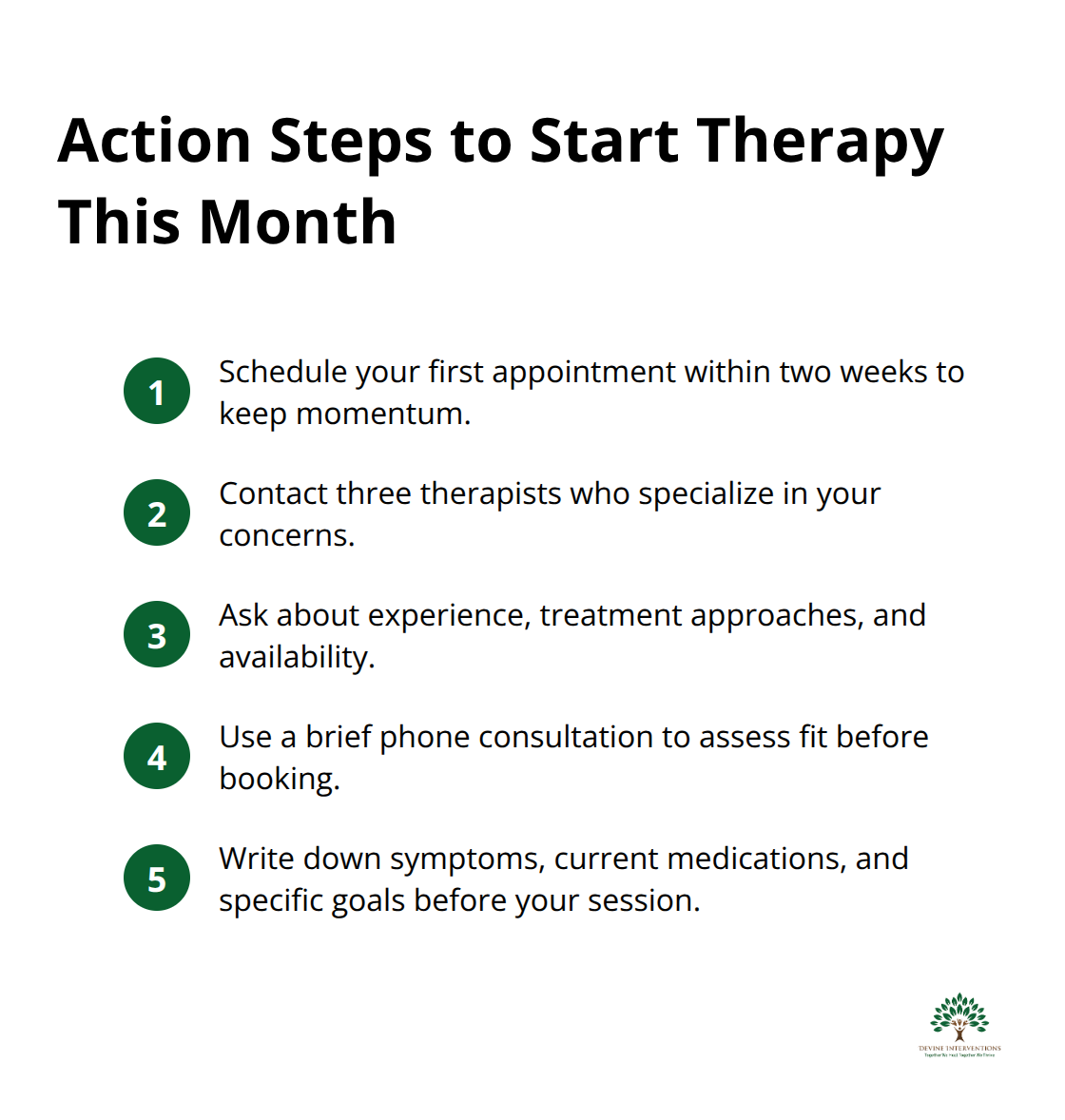Taking the first step toward therapy can feel overwhelming, especially when you’re already struggling with mental health challenges.
We at Devine Interventions understand that knowing where to begin makes all the difference. These essential tips for starting therapy will guide you through the process, from recognizing when you need support to building a strong therapeutic relationship.
The journey toward better mental health starts with understanding your options and taking that brave first step.
When Should You Consider Therapy?
Nearly 60 million adults in the United States experienced a mental health condition in 2022 according to recent statistics. Yet many people wait years before they seek professional help, often they dismiss their struggles as something they should handle alone. Research shows that persistent changes in sleep patterns, appetite, or energy levels that last more than two weeks signal the need for professional support. When daily activities become consistently difficult, when relationships suffer due to your emotional state, or when you find yourself using substances to cope, therapy becomes necessary rather than optional.
Normal Stress Versus Mental Health Concerns
Normal stress responds to specific situations and fades when the stressor resolves. Mental health concerns persist even when external circumstances improve. The American Psychological Association defines the difference clearly: stress reactions typically last days or weeks, while mental health symptoms continue for months. If you experience panic attacks, persistent sadness that interferes with work or relationships, or thoughts of self-harm, you need professional intervention immediately. Physical symptoms like chronic headaches, digestive issues, or unexplained aches often accompany mental health struggles and you shouldn’t ignore them.
Mental Health Stigma Barriers
Cultural beliefs still prevent many from seeking help, with some communities viewing therapy as weakness rather than strength. The truth is that seeking help is a sign of strength, not weakness. Therapy provides evidence-based techniques like cognitive behavioral therapy that develop real coping skills. Professional therapists offer structured approaches that friends and family, despite their good intentions, simply cannot provide. Waiting for a crisis to seek help costs more time, money, and emotional energy than addressing concerns early through preventive mental health care.
Once you recognize the need for professional support, the next step involves preparing for your first therapy session and finding the right therapist who matches your specific needs and treatment goals.
How Do You Choose the Right Therapist?
The right therapist matches your specific needs with proven treatment approaches. Cognitive Behavioral Therapy works best for anxiety and depression, with research showing 43% of patients report at least a 50% reduction in depression symptoms over 46 months, compared to 27% with usual care alone. Eye Movement Desensitization and Reprocessing targets trauma and PTSD specifically, while Dialectical Behavior Therapy excels for emotional regulation challenges. Solution-Focused Brief Therapy addresses specific problems quickly (typically within 6-10 sessions). Don’t settle for generic therapy when specialized approaches exist for your particular concerns.
Treatment Approaches That Work
Different therapeutic methods address different conditions with varying success rates. Cognitive Behavioral Therapy helps clients identify and change negative thought patterns that fuel anxiety and depression. EMDR processes traumatic memories through bilateral stimulation techniques that reduce emotional intensity. Dialectical Behavior Therapy teaches distress tolerance and interpersonal skills for those who struggle with intense emotions.

Motivational interviewing works particularly well for substance use concerns and behavior change resistance.
Questions That Reveal Therapist Quality
Ask direct questions about their experience treating your specific condition. How many clients with similar issues have they helped in the past year? What treatment methods do they use, and what success rates do they achieve? Request information about their licensing, years of practice, and continuing education. Inquire about session frequency, treatment duration expectations, and their policy for between-session contact. Most importantly, ask about their approach to measuring progress and how they handle situations where treatment isn’t working.
Steps to Schedule Your First Session
Contact three to five therapists before you make your decision. The Psychology Today directory and your insurance provider’s website offer filtered searches by specialty and location. Many therapists offer brief phone consultations to assess fit before you schedule. Book your first appointment within two weeks of your initial contact to maintain momentum. Prepare for your first session when you write down your symptoms, goals, and questions about the therapeutic process.
Once you’ve selected your therapist and scheduled your appointment, you’ll want to know what happens during those first few sessions and how to make the most of this new relationship.
What Happens in Your First Few Sessions
Your first therapy session will last 60 to 90 minutes and focuses on comprehensive information about your mental health history, current concerns, and treatment goals. The American Psychological Association reports that 52% of people find a suitable therapist on their first try, but this initial meeting may feel awkward as you share personal details with a stranger. Your therapist will ask about your symptoms, family dynamics, past trauma, medications, and what brought you to therapy now.

Write down your current symptoms, any medications you take, and specific goals you want to achieve before you arrive. Most therapists use standardized assessment tools like the GAD-7 for anxiety or PHQ-9 for depression to establish baseline measurements and track your progress over time.
Initial Assessment Process
The therapist conducts a thorough evaluation that covers your complete mental health picture. They examine your family history, previous therapy experiences, current stressors, and support systems. This assessment helps them understand patterns in your life and identify the most effective treatment approach. You’ll discuss your childhood experiences, relationships, work situation, and any significant life events that shaped your current mental state. The therapist also evaluates your risk factors and protective factors to create a comprehensive treatment plan tailored to your specific needs.
Trust Development
Trust develops gradually through consistent interactions, not during a single session. Research shows that the therapeutic relationship plays a crucial role in treatment success, making this connection more important than the specific therapy technique used. Your therapist should explain their approach clearly, respect your boundaries, and respond to your questions without defensiveness. Pay attention to how you feel after each session – you should leave with a sense that someone heard and understood you, even if the topics were difficult. If you feel judged, dismissed, or uncomfortable after multiple sessions, switch therapists immediately.
Communication Expectations
Effective communication requires honesty from you about what works and what doesn’t. Your therapist will assign homework, teach specific coping skills, and track measurable improvements in your symptoms. Many clients notice positive changes after several sessions, but discuss concerns about progress with your therapist at any point. Strong emotional responses during sessions, including increased sadness or anxiety, often indicate the therapeutic process works rather than fails. Sessions typically occur weekly initially, then may space out as you develop stronger coping skills.
Final Thoughts
Schedule your first therapy appointment within the next two weeks to maintain momentum and improve your follow-through rates. Contact three therapists who specialize in your specific concerns and ask about their experience, treatment approaches, and availability. Most therapists offer brief phone consultations to assess compatibility before you commit to a full session (this saves time and helps you find the right fit).

Write down your symptoms, current medications, and specific goals before your first meeting. This preparation helps you communicate clearly when emotions feel overwhelming during those initial sessions. Mental health support extends beyond individual therapy through community support groups, crisis hotlines, and peer counseling programs that complement professional treatment.
We at Devine Interventions understand that these tips for starting therapy require courage to implement. Our approach combines individual therapy, group sessions, and case management to support your recovery journey. Your mental health deserves the same attention you give your physical health, and that first phone call represents positive change rather than failure.







